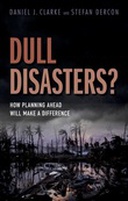Explore

Economic losses from disasters are now reaching an average of US$250–$300 billion a year. In the last 20 years, more than 530,000 people died as a direct result of extreme weather events; millions more were seriously injured. Most of the deaths and serious injuries were in developing countries. Meanwhile, highly infectious diseases will continue to emerge or re-emerge, and natural hazards will not disappear. But these extreme events do not need to turn into large-scale disasters. Better and faster responses are possible. The authors contend that even though there is much generosity in the world to support the responses to and recovery from natural disasters, the current funding model, based on mobilizing financial resources after disasters take place, is flawed and makes responses late, fragmented, unreliable, and poorly targeted, while providing poor incentives for preparedness or risk reduction. The way forward centres around reforming the funding model for disasters, moving towards plans with simple rules for early action and that are locked in before disasters through credible funding strategies—all while resisting the allure of post-disaster discretionary funding and the threat it poses for those seeking to ensure that disasters have a less severe impact.
This book is included in DOAB.
Why read this book? Have your say.
You must be logged in to comment.
Rights Information
Are you the author or publisher of this work? If so, you can claim it as yours by registering as an Unglue.it rights holder.Downloads
This work has been downloaded 320 times via unglue.it ebook links.
- 171 - pdf (CC BY) at OAPEN Library.
Keywords
- Aid & relief programmes
- Behavioural psychology
- Commitment device
- Decision-making
- Development economics & emerging economies
- Development Studies
- Disaster risk finance
- Economics
- Economics, finance, business & management
- Emergency management
- Extreme event
- Insurance
- Interdisciplinary Studies
- Natural disaster
- Pandemic
- Planning
- Political Economy
- Politics of disaster relief
- Reference, information & interdisciplinary subjects
- Reinsurance
- Risk management
- Social impact of disasters
- Social issues & processes
- Social services & welfare, criminology
- Social welfare & social services
- Society & culture: general
- Society & Social Sciences
- thema EDItEUR::G Reference, Information and Interdisciplinary subjects::GT Interdisciplinary studies::GTP Development studies
- thema EDItEUR::J Society and Social Sciences::JB Society and culture: general::JBF Social and ethical issues::JBFF Social impact of disasters / accidents (natural or man-made)
- thema EDItEUR::J Society and Social Sciences::JK Social services and welfare, criminology::JKS Social welfare and social services::JKSR Aid and relief programmes
- thema EDItEUR::K Economics, Finance, Business and Management::KC Economics
- thema EDItEUR::K Economics, Finance, Business and Management::KC Economics::KCM Development economics and emerging economies
- thema EDItEUR::K Economics, Finance, Business and Management::KC Economics::KCP Political economy
- Time inconsistency
Links
DOI: 10.1093/acprof:oso/9780198785576.001.0001Editions

